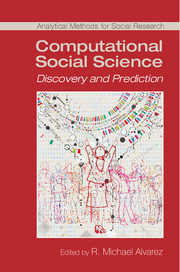Book contents
- Frontmatter
- Contents
- Preface
- Introduction
- PART 1 COMPUTATIONAL SOCIAL SCIENCE TOOLS
- 1 The Application of Big Data in Surveys to the Study of Elections, Public Opinion, and Representation
- 2 Navigating the Local Modes of Big Data: The Case of Topic Models
- 3 Generating Political Event Data in Near Real Time: Opportunities and Challenges
- 4 Network Structure and Social Outcomes: Network Analysis for Social Science
- 5 Ideological Salience in Multiple Dimensions
- 6 Random Forests and Fuzzy Forests in Biomedical Research
- PART 2 computational social science applications
- Conclusion Computational Social Science: Toward a Collaborative Future
- Index
2 - Navigating the Local Modes of Big Data: The Case of Topic Models
from PART 1 - COMPUTATIONAL SOCIAL SCIENCE TOOLS
Published online by Cambridge University Press: 05 March 2016
- Frontmatter
- Contents
- Preface
- Introduction
- PART 1 COMPUTATIONAL SOCIAL SCIENCE TOOLS
- 1 The Application of Big Data in Surveys to the Study of Elections, Public Opinion, and Representation
- 2 Navigating the Local Modes of Big Data: The Case of Topic Models
- 3 Generating Political Event Data in Near Real Time: Opportunities and Challenges
- 4 Network Structure and Social Outcomes: Network Analysis for Social Science
- 5 Ideological Salience in Multiple Dimensions
- 6 Random Forests and Fuzzy Forests in Biomedical Research
- PART 2 computational social science applications
- Conclusion Computational Social Science: Toward a Collaborative Future
- Index
Summary
INTRODUCTION
Each day humans generate massive volumes of data in a variety of different forms (Lazer et al., 2009). For example, digitized texts provide a rich source of political content through standard media sources such as newspapers, as well as newer forms of political discourse such as tweets and blog posts. In this chapter we analyze a corpus of 13,246 posts that were written for six political blogs during the course of the 2008 U.S. presidential election. But this is just one small example. An aggregator of nearly every document produced by the U.S. federal government, voxgov.com, has collected more than eight million documents from 2010–2014, including over a million tweets from members of Congress. These data open new possibilities for studies of all aspect of political life from public opinion (Hopkins and King, 2010) to political control (King, Pan, and Roberts, 2013) to political representation (Grimmer, 2013).
The explosion of new sources of political data has been met by the rapid development of new statistical tools for meeting the challenges of analyzing “big data.” (National Research Council, 2013; Grimmer and Stewart, 2013; Fan, Han, and Liu, 2014). A prominent example in the field of text analysis is latent Dirichlet allocation (LDA) (Blei, Ng, and Jordan, 2003; Blei, 2012), a topic model that uses patterns of word co-occurrences to discover latent themes across documents. Topic models can help us deal with the reality that large data sets of text are also typically unstructured. In this chapter we focus on a particular variant of LDA, the structural topic model (STM) (Roberts et al., 2014), which provides a framework to relate the corpus structure we do have (in the form of document-level metadata) with the inferred topical structure of the model.
Techniques for automated text analysis have been thoroughly reviewed elsewhere (Grimmer and Stewart, 2013).We instead focus on a less often discussed feature of topic models and of latent variable models more broadly: multimodality. That is, the models discussed here give rise to optimization problems that are nonconvex. Thus, unlike workhorse tools such as linear regression, the solution we find can be sensitive to our starting values (in technical parlance, the function we are optimizing has multiple modes). We engage directly with this issue of multimodality, helping the reader understand why it arises and what can be done about it.
Information
- Type
- Chapter
- Information
- Computational Social ScienceDiscovery and Prediction, pp. 51 - 97Publisher: Cambridge University PressPrint publication year: 2016
Accessibility standard: Unknown
Why this information is here
This section outlines the accessibility features of this content - including support for screen readers, full keyboard navigation and high-contrast display options. This may not be relevant for you.Accessibility Information
- 75
- Cited by
